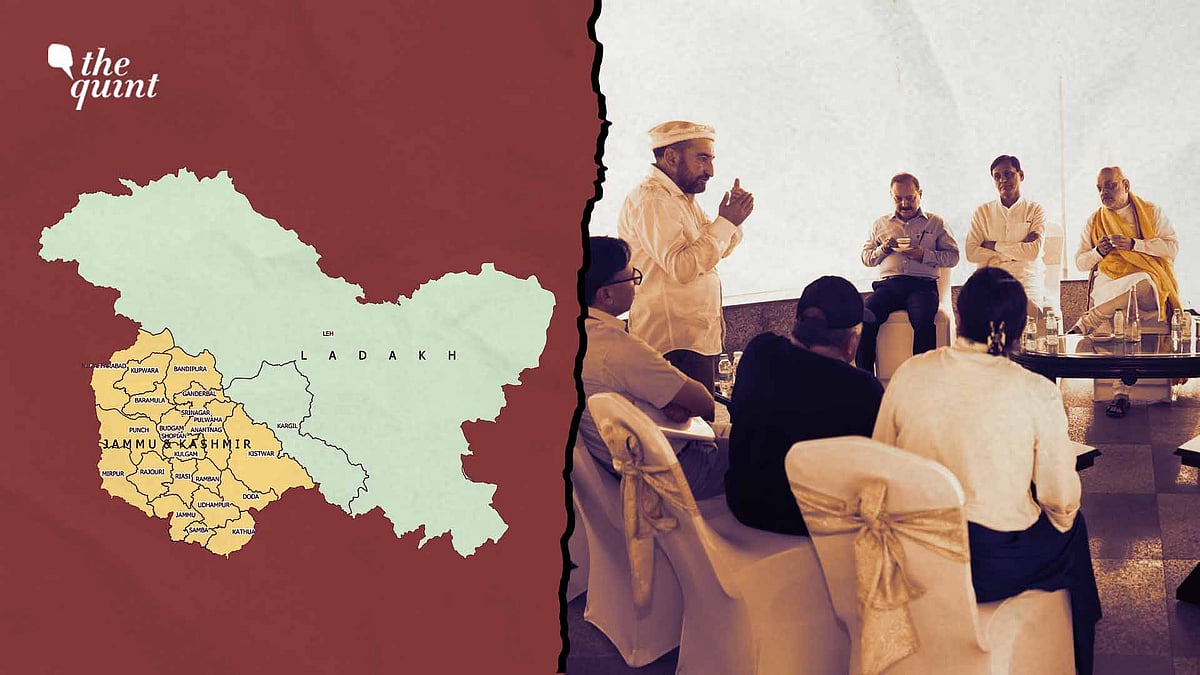Ladakh Row: First Round of Talks With MHA Post Violence Shows Signs of Thaw
Apart from the Sixth Schedule, Ladakhi representatives demanded the revocation of the NSA imposed on Sonam Wangchuk.

advertisement
Almost a month after the deadly violence in Ladakh left four civilians dead and over 80 injured, representatives from the Himalayan region said they noticed a "positive shift" and a "more accommodating attitude" from the Ministry of Home Affairs (MHA) during their meeting on Wednesday, 22 October.
Since 2023, at least 10 meetings have taken place between the leaders of Ladakh under the banner of the Leh Apex Body and the Kargil Democratic Alliance and the high-powered committee (HPC) constituted by the MHA. The last round of dialogue was held in May this year.
As the dialogue resumed after five months, Cherring Dorjay Lakruk, co-chairman of the Leh Apex Body, told The Quint they could feel that the MHA was "serious" about resolving all the problems.
Article 371 for Ladakh?
Sources privy to the discussions told The Quint that the MHA officials indicated that special provisions guaranteed under Article 371 of the Constitution can be considered for Ladakh, although the Ladakhi leaders remained firm on their demands for the Sixth Schedule.
“Yes, Article 371 was proposed, but they said they are ready to discuss any other provisions that the leaders of Ladakh want to discuss,” Ashraf Ali Barcha, a Ladakhi representative in the negotiations, said.
Article 371 of the Constitution provides special provisions and limited autonomy to certain states, granting them temporary and transitional powers. It is currently applicable in 12 states, including Nagaland, Assam, Manipur, Mizoram, Maharashtra, Gujarat, Andhra Pradesh, Telangana, Arunachal Pradesh, Goa, Sikkim, and Karnataka.
“We also demand that the victims of the 24 September incident should be compensated,” Lakruk said.
Advocate Mustafa Haji, Legal Advisor to the Leh Apex Body, explained to The Quint that for New Delhi to extend Article 371 to Ladakh, it would first need to establish a legislative body.
“But that seems unlikely, and we sensed that the MHA isn’t inclined to grant a legislature. Instead, they hinted at empowering the hill councils,” he said, adding, “We did not agree to that.”
He further said they are adamant on their demand for the Sixth Schedule and the statehood, and are ready to continue the discussions further on these terms only.
The meeting between the MHA and the Ladakhi representatives lasted for over two hours. Over 12 members from both the groups participated. Ladakh MP Mohmad Haneefa Jan attended the meeting as well.
“We are expecting a breakthrough soon,” said Barcha, adding the talks were cordial, wherein the representatives spoke openly about all their concerns, and emphasised the need for time-bound meetings and prompt resolution of their demands.
“The MHA officials assured us that they would take up these issues with senior authorities,” he said.
Barcha said the next round of talks is expected to take place within a week, adding that officials assured them the HPC meeting would follow soon after—likely in the first or second week of November.
The HPC, headed by Minister of State Nityanand Rai, was constituted by the MHA to “ensure protection of land and employment” for the people of Ladakh.
All Eyes on the Next Meeting
For the past four years now, the people in the Himalayan region have been protesting for some constitutional safeguards, which include statehood for Ladakh, jobs, protection of their land and resources, and a parliamentary seat each for Leh and Kargil districts.
On 24 September, Leh witnessed deadly protests after years of peaceful demonstrations, prompting authorities to detain dozens, including activist Sonam Wangchuk. As the protests turned violent, the authorities imposed curfew and snapped the internet for many days.
Following that, the two civil society groups—the Leh Apex Body and the Kargil Democratic Alliance—pulled out from the dialogue process with the HPC. However, on 17 October, the Union Home Ministry ordered a judicial inquiry into the violence in Leh, and invited the sub-committee members of Ladakh for talks.
According to a notification issued by the MHA, the judicial probe, to be headed by Justice BS Chauhan, a former judge of the Supreme Court, is mandated to investigate the “circumstances leading to the serious law and order situation, the police action, and the resultant unfortunate deaths of four people”.
All eyes are now on the next round of meetings, scheduled to take place within a week. The talks are expected to determine whether New Delhi is willing to make any concrete commitments toward addressing Ladakh’s long-pending demands or not.
(This reporter has reached out to the MHA for their response post the meeting. The story will be updated as and when they respond.)
(Auqib Javeed is an independent journalist from Jammu and Kashmir reporting on politics and human rights.)